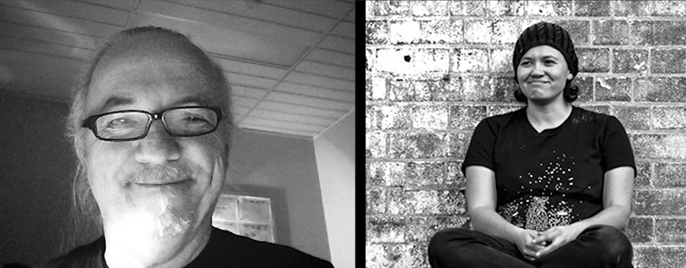What new elements did the edit bring to ‘Underbelly Razor’ to make it different from the previous series?
Steve Evans (SE): Apart from Deb and I, Neil Thumpston edited two episodes including the excellent episode 10. The previous coverage was multi-cam, hand-held and no two setups were ever the same. This time the camerawork was different so that dictated a different edit. The coverage was more classic with an emphasis on the look of the shot, a lot of wider shots, less coverage in a scene so the edit was more considered. Having said that by the end of the series the editing style evolved and sat somewhere between ‘Razor’ and the previous approach. Regarding my episodes this was probably due to Shawn Seet's direction as he is really keen to add new and dynamic ideas, so there is a lot of encouragement to try out new approaches.
Deb Peart (DP): Our wonderful directors Tony Tilse, Cherie Nowlan, Shawn Seet, David Caesar & Mat King alongside DOP wonder man Mark Wareham, really took quite a different approach to this season... a more classic approach in terms of coverage and this in turn influenced the cut. The editing is certainly not as fast and furious as previous seasons and the challenge was the keep the elements that people expect from ‘Underbelly’ in terms of energy; but then utilising this wonderful, rich canvas we were getting through the rushes. I found it challenging at times to allow myself to feel more confident with the wider coverage, but now I feel I can never really go back. I think twice about going into CU's. If you imagine how many huge widescreen television sets are out in people's living room's today; I think television can certainly afford to stay wider longer.
The graphics take on a life of their own - it has a sense of humour as well as information thrown into it and a prophetic nature. Did that develop in the edit phase?
SE: I came on from Block 2 that is episode 3 and 4 and Deb had already introduced lots of new ideas about the graphics so we ran with those. Later in the series we took still photos in a newspaper image and animated those to become stock footage, I particularly liked the boats in Sydney Harbour coming to life!
DP: A lot of the text that appeared on screen would often evolve from the script and then through the edit. We would add more if necessary or remove if it felt a little overcooked.
There are key scenes in each episode, which are given the standard dramatic edit attention while the rest is stylised fast editing, slow mo, parallel stories thread together by the narrator and or music. How much of this is determined in the edit?
SE: My experience is that I have a completely free hand in the edit to be inventive, in fact the directors and the producers expect it.
DP: Everything Steve said! It really is the only show I think I've worked on in that does continuously evolve well into post. You aren't restricted by standard editing conventions, if something feels like it isn't working or can be enhanced you can turn it on its head and no one looks at you like your nuts (ok maybe sometimes).
Describe a normal days work in the edit suite during the shoot.
SE: The two stages are Rushes and then the cut with the Director, Producers etc. A typical day in rushes is to watch all the rushes and make selects or assemble bits I like as I go along. I will have assembled all of the previous days rushes each day. With some big key scenes I sometimes wait and will watch the rushes a further two or three times before I assemble it. Towards the end of the day I will look at the previous days assembled scenes to see how they shape up. I’ll also be listening to music and selecting tracks for potential use as this is such a key element in the editing of ‘Underbelly’.
DP: A typical day with the director is to look at my assembly and then set about working with the strengths of the story, identifying problems, assessing the tone of scenes and reviewing alternate takes and working towards a finished episode with all the parameters that you have to fulfil on network TV.
What's your favourite experience working on the series?
SE: Getting a contract! Seriously I really love working on the series as we have a lot of freedom in the edit, we work with music that I really like, there is a great team feeling in Post amongst supervisor, assistants and editors, and there's a certain seat-of-the-pants quality that makes it a lot of fun.
DP: Definitely the people. We've been at it for a while now and there's a wonderful sense of camaraderie in our little editorial crew and with the other departments. We have a great post supervisor in Benita Carey who has made a point of giving opportunities to new assistant editors and its wonderful to watch them develop as each season goes on. I also love the sound battles Steve and I have, when we blast our respective music across the hall at each other!
